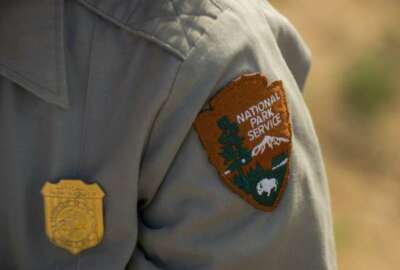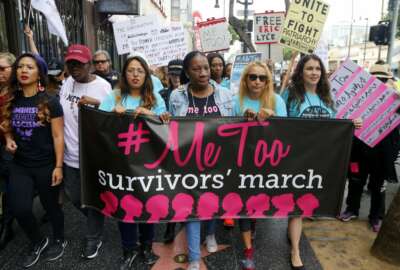
Forest Service chief insists she can reverse longstanding culture of harassment, retaliation
The Forest Service has implemented new programs in attempt to reverse employee harassment, misconduct and retaliation, but victims say the agency's efforts "che...
As the Forest Service employees battle California’s deadliest wildfire for another week, the agency’s chief took to Capitol Hill to send a message about a problem that’s been festering at her organization for much longer.
Vicki Christiansen, who’s been the permanent Forest Service chief for one month after serving in an interim capacity for seven, said she and the agency have zero tolerance for the harassment, misconduct and retaliation that’s run rampant at the organization.
“Most of the employees are excellent public servants,” she told the House Oversight and Government Reform Committee Thursday. “Just like any large population, there are people who are not doing the right thing, they are not respecting each other. That is not okay. We have established a very specific code of conduct, and we are holding people accountable to that conduct.”
The House oversight committee questioned Forest Service leadership two years ago about rampant misconduct and harassment at the agency, but members said they’re still getting complaints from employees.
A group of 100 women wrote to Christiansen last week detailing their concerns with recent steps the agency has taken to create a more inclusive culture.
The Forest Service this fall appointed a senior executive to lead the agency’s new Office of Work Environment and Performance. It also established an employee advisory group on workplace improvement and published a new employee code of conduct.
Forest Service supervisors have a standard in their performance plans to weed out and address employee misconduct, preferably before it happens.
Since the Forest Service stood up a new complaint and investigation system in August 2017, the agency received 1,490 complaints. Investigators have finished reviewing 55 percent of those complaints, the agency said. Misconduct was substantiated for 24 percent of completed investigations. Within the last three years, the Forest Service fired 634 employees for misconduct.
Prior to Christiansen’s tenure as Forest Service chief, the agency amended its anti-harassment policy, opening up a harassment reporting center and held senior leader listening sessions.
The entire workforce was required to participate in these sessions, which were intended to serve as a place where employees could share their ideas and concerns with their supervisors.
But Shannon Reed, a former Forest Service employee who shared the grueling details of the harassment, misconduct and retaliation that she experienced at the agency with the House committee, said the listening sessions were uncomfortable and chilling.
Because the agency held these listening sessions within individual work groups, Reed and other victims like her were expected to voice their concerns often in the same room as their perpetrators. Victims said they saw these sessions as a mere “check-the-box” activity.
“How in the hell can you have the perpetrator in the room with the victim?” House Oversight and Government Reform Committee Chairman Trey Gowdy (R-S.C.) asked. “How does that happen?”
Christiansen took notes as Reed detailed her experience at those sessions, which she described as humiliating. Reed said she was retaliated against for speaking up about her harassment and was fired from the Forest Service in October.
Christiansen calls for culture change
But Christiansen said she’s in a good position to tackle the agency’s longstanding culture of harassment, misconduct and retaliation. She’s a 38-year federal employee and said she experienced harassment herself during her career with the Forest Service.
“Everyone’s experience is their own experience, so I don’t want to say I know how people feel,” she said. “But I know I have an experience, and I know what commitment that brings for me. There’s a long legacy of great conservation work, and there are great women, people of color of all races that contribute to that work. They absolutely have to have the right, safe place to contribute that work.”
“We have come a long way,” Christiansen added. “It’s shame on us if we don’t move the needle on how women and minorities are treated. It is our time to permanently upend the long-rooted behaviors and norms. That’s what I’m committed to do, because I have an experience.”
Many members of the House oversight committee, however, questioned whether Christiansen’s plans to change the agency’s culture are going far and fast enough.
“I would like to say I could change it in six months, but to be absolutely honest, I don’t think you change a culture of an organization that’s existed for 113 years, that has 40,000 people that has a mission of getting a critical job done in remote locations, overnight. We’re working to work with stead and with haste to break through to change the parts of the culture that we see as most important.”
“I just don’t buy that,” Rep. Glenn Grothman (R-Wis.) said.
Christiansen said there are some small signs that things are improving. Reports at the harassment call center are up, which the agency sees as a sign that more employees feel comfortable speaking up.
Independent contractors are conducting an agency-wide review of the Forest Service’s employee conduct and harassment policies.
The Agriculture Department’s inspector general set up a special investigation unit to review employee claims.
Phyllis Fong, USDA’s IG, said government is just beginning to more earnestly grapple with harassment and assault issues. It’s still a learning experience for many agencies.
“In the oversight community … we’re starting to do work across the government on these issues, and they’re new issues for us, for oversight,” Phyllis Fong, USDA’s inspector general, said. “[There’s] a need for us in the oversight community to get together and to say, what are the best ways that we can offer to our agencies? What are the things they should be looking for? How can we provide standards or guidance or best practices?”
Copyright © 2024 Federal News Network. All rights reserved. This website is not intended for users located within the European Economic Area.
Nicole Ogrysko is a reporter for Federal News Network focusing on the federal workforce and federal pay and benefits.
Follow @nogryskoWFED
Related Stories

NPS answering ‘wake-up call’ to address sexual harassment, employee misconduct




